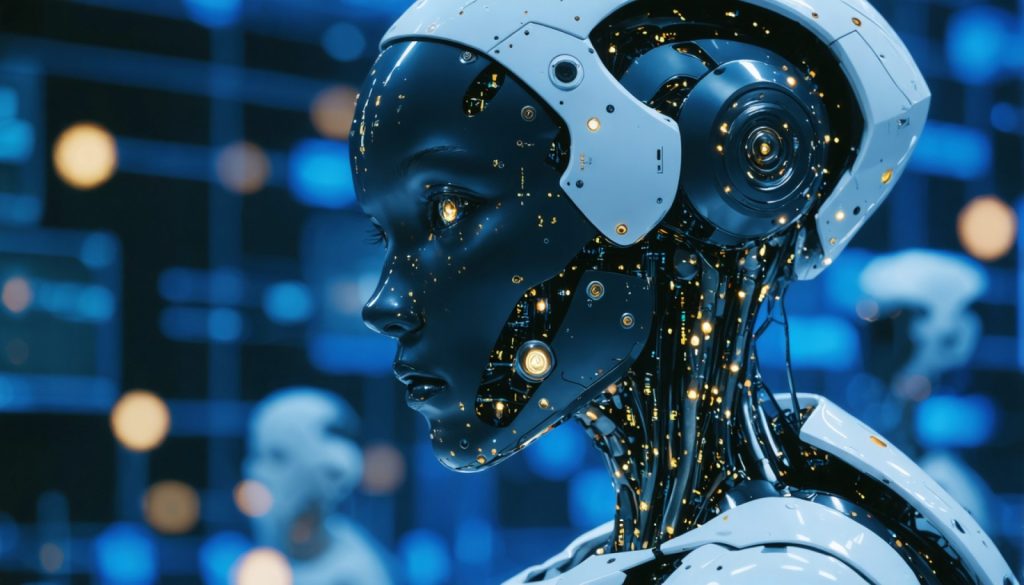
- Artificial intelligence presents both immense potential and significant ethical challenges, centered around control and trust in AI systems.
- Tech giants, with vast data repositories, are key players but raise concerns over data privacy and AI biases, particularly in predictive and facial recognition technologies.
- AI biases represent societal prejudices, reproduced through flawed datasets, often disadvantaging marginalized groups.
- There is a critical need for regulation akin to GDPR to establish AI governance, transparency, and accountability.
- Empowered ethics boards should guide AI’s ethical development, ensuring diverse voices are considered in decision-making processes.
- Transparency and understandability of AI systems are essential for ensuring fair and just outcomes impacting fundamental rights.
- Public AI literacy is vital for informed engagement in AI ethics, enabling society to influence and guide technological progress.
- Harnessing AI responsibly requires knowledge, advocacy, and commitment to ensuring technology benefits all humanity.
Amid the ceaseless hum of innovation, artificial intelligence rises—a dazzling beacon of potential or a Pandora’s box waiting to be opened. Mega-corporations, those omniscient watchtowers of Silicon Valley, wield this power with the finesse of virtuosos. Yet, as they orchestrate AI’s symphony, a cacophony of ethical concerns emerges. At the heart of this discourse is an urgent dilemma: Who truly controls these intelligent algorithms, and can society trust them?
Every nuance of AI’s impact is a tapestry we are yet to fully unravel. Still, most threads trace back to a few technology giants. Their data repositories could make Orwell’s dystopia look quaint. These companies possess insights so refined that they could predict your breakfast choice from a digital fingerprint. However, such concentrated power demands scrutiny, as the biases embedded within AI systems are not just ephemeral issues—they’re echoes of societal injustices reverberating through algorithms.
Consider this: AI bias isn’t just a bug; it’s a societal scar mapped onto silicon chips and neural networks. Historical prejudices find new life in the bias-ridden datastreams that teach these systems. Facial recognition technology, for example, struggles to identify individuals with darker skin tones—a stark reminder of the inequalities data alone cannot erase. The technologies promise convenience but may insidiously reinforce the divides they claim to bridge.
With urgency rivaling a gold rush, the tech giants thrust innovations into the world, often prioritizing speed over safety. The “move fast and break things” mantra, a relic of bygone tech eras, now dances dangerously close to a precipice. Imagine an AI misdiagnosing a medical condition or an algorithmic gatekeeper systematically denying opportunities to marginalized groups. It’s a high-speed chase where the collateral is nothing less than human dignity and equity.
Regulation dangles as both a balm and a beacon. It should usher in a new epoch of AI governance with stringent guidelines, akin to the transformative GDPR for data privacy. Empowered ethics boards should rise, vibrant and diverse—twin lighthouses guiding AI’s ethical use. These bodies, unifying voices from varied disciplines, would enforce accountability, illuminating the paths these tech titans dare not tread alone.
Transparency in AI is not merely a luxury but a necessity. Systems impacting fundamental rights must be dissected until their logic is clear and their judgments just. Imagine AI systems explained, not mystified—where users truly understand how critical decisions in their lives are made.
Ultimately, the solution lies not only in oversight and regulation but in the public’s hand—a populace equipped with AI literacy, ready to engage with the ethical questions of tomorrow. Empowered citizens can steer the AI debate, demanding a fairer future where technology serves all humanity.
As we walk this algorithmic tightrope, AI’s potential might seem daunting. But through knowledge, advocacy, and perhaps a bit of hope, society can wield this power wisely and inclusively. After all, the code that defines tomorrow is written by the choices we make today.
AI’s Ethical Dilemma: Navigating the Future of Technology with Transparency
Understanding AI Control and Trust
The questions of control and trust in AI are pivotal. As tech giants develop more sophisticated AI, understanding who controls these algorithms becomes essential. The concentration of power raises questions about transparency and the motivations behind these advancements.
AI Bias: A Persistent Challenge
AI bias is a well-documented issue. Bias in AI is not merely a technical glitch but a reflection of existing societal biases. A well-known example is in facial recognition technologies, which have been shown to have higher error rates for individuals with darker skin tones (https://www.nature.com). Such biases can perpetuate discrimination if left unchecked, underscoring the need for ethical AI development.
Balancing Innovation and Safety
The tech industry’s “move fast and break things” culture prioritizes innovation but can overlook safety. Rapid AI deployment without thorough testing poses risks, such as misdiagnosed medical conditions or systematic biases in employment and other areas.
How to Improve AI Transparency and Accountability
1. Educate and Empower the Public: Increasing AI literacy among the general populace can help individuals better understand AI’s impact and engage in discussions about ethical use.
2. Establish Stronger Regulations: Implement regulatory frameworks similar to GDPR for AI, focusing on transparency and accountability. Ethics boards can guide companies, ensuring diverse perspectives are considered.
3. Scope of Transparency: Tech companies should explain AI systems clearly, allowing users to understand decision-making processes that affect them.
4. Independent Audits: Companies should undergo regular, independent audits to ensure compliance with ethical guidelines, similar to financial audits.
Insights and Industry Trends
The AI industry is rapidly evolving, with new trends emphasizing ethical AI development, like the push for more human-in-the-loop systems where humans maintain oversight of AI decisions. Additionally, the growth of explainable AI aims to demystify algorithms, making AI more transparent and understandable.
Pros and Cons of AI Development
Pros:
– Efficiency and Convenience: AI can streamline processes in healthcare, logistics, and customer service, offering increased efficiency (https://www.ibm.com).
– Innovation Potential: New possibilities in personalized medicine, smart cities, and more driven by AI.
Cons:
– Bias and Discrimination: Risk of perpetuating societal biases and discrimination.
– Privacy Concerns: Potential misuse of personal data collected for AI training.
Actionable Recommendations
– Demand Transparency: Consumers should ask companies for more transparent practices and understanding of AI processes affecting them.
– Engage in Policy Discussions: Stay informed and participate in discussions about AI policies and ethics.
– Foster Inclusivity in AI Development: Encourage diverse teams in tech development to ensure AI systems are well-rounded and less biased.
For more information on AI development and ethics, visit IBM or Nature for credible sources and ongoing research.
By focusing on ethical AI practices and informed public engagement, society can ensure technology serves all, propelling us toward a future where AI is a tool for equity and progress.



